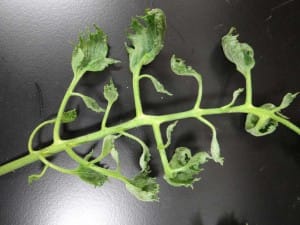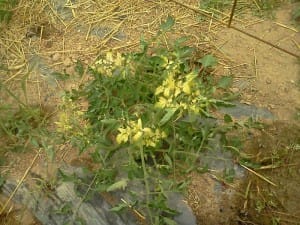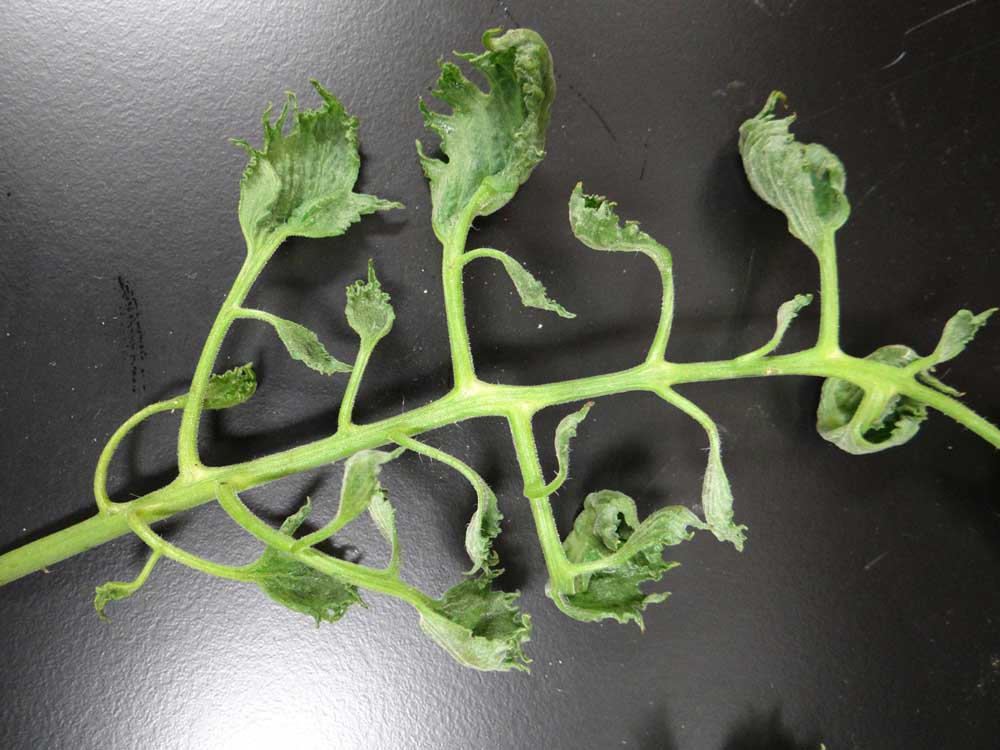Oftentimes community gardens are located on county Parks and Recreation land or in the middle of land maintained by people other than the community gardeners. School gardens have maintenance crews that maintain the land near the school garden. How this surrounding land is managed can have an affect on your garden. Sadly, herbicide damage to community garden plants when the garden itself does not allow herbicides is common. The article below by UGA’s Donn Cooper explains:
Broad-leaf herbicides
Herbicides applied to lawns and hay fields contain compounds that selectively affect broad-leafed weeds, such as dandelion and thistle, but do not kill the grass. Tomatoes, grapes, peppers and other broad-leafed plants are damaged when the herbicides move from the lawns and fields into the vegetable garden.
These herbicides — 2,4-D and pyridine compounds — cause the most striking damage on sensitive plants by short-circuiting the plants’ hormonal system and ability to regulate growth, said Elizabeth Little, a University of Georgia Plant Pathologist.
Parallel veins and cupping are some of the symptoms in the new growth of plants affected by these herbicides.
Because Georgians love tomatoes — and hate weeds, this is an issue that Extension personnel at the UGA see again and again.
“People often do not understand how the herbicide was able to move into their gardens and will swear up and down that no herbicides were used, but the symptoms are distinctive,” said Little. “Unwanted herbicide can come from different sources.”

Means of exposure
Some of those sources are obvious. For example, herbicide sprays to the lawn can become airborne and harm plants within close proximity. Even with barely a breeze, compounds applied as sprays can drift quite far from the site of application.
But there are more subtle avenues for accidental damage. In hot weather herbicide compounds on lawns can volatize, or become a gas, and eventually affect vegetables around the home.
Gardeners using grass clippings as mulch should be mindful that the clippings could have been treated with herbicide.
Herbicide in manure
While most lawn herbicides will break down within a few months, some of these herbicides, especially those applied to hay fields, will persist in the environment for several years.
Pyridine compounds — such as picloram, clopyralid and aminopyralid — appear to be causing the most damage in home gardens. These herbicides can reach gardens through composted manure from animals fed with treated hay, said Little.
“Horse manure is a very common source of unwanted herbicide because the hay that horses eat is very often sprayed with these persistent herbicides,” said Little, who is an Extension specialist in integrated disease management with the College of Agricultural and Environmental Sciences.
Growers need to be mindful about the origins of their compost and mulch. Organic farmers can even lose their certification by accidentally introducing contaminated compost from off-farm sources.
“Many gardeners have stopped using horse manure, which is a shame,” said Little.
She points out that horse manure is often easy to obtain and has a balanced nutrient composition. Although likely free of 2,4-D and related herbicides, poultry manure can create problems with nitrogen and phosphorous if used in excess.

Ask about pasture treatments
Little suggests that gardeners who buy manure should ask what herbicides were applied to the pasture and to the hay that the animals consume. Anyone who grows hay should be able to provide a list of his or her herbicide treatments.
Hay field herbicides are used so commonly because the farmers can have persistent problems with tough perennial weeds such as thistles and dock.
“With more and more people wanting to grow their own food, I think it is something that we all need to be aware of,” said Little.
Glyphosate has different symptoms
Glyphosate, another herbicide often used around the home, causes different damage on tomatoes. It affects the whole plant, not just new growth, and can be identified in bleached, yellow leaves.
If you have any questions about whether herbicide damage has affected your community or school garden, contact your local UGA Extension agent. He/she has experience with this.
Happy Gardening!
- ParSLAY the Day! - June 12, 2024
- 6th Annual Great Southeast Pollinator Census - May 28, 2024
- Are you ready for Pepper Palooza? - July 5, 2023

Good information, particularly related to the off-gassing of herbicides at high temperatures.
Thanks for mentioning glyphosphate, which is the main one I use. Now I know what to look for.
Thank you for addressing this issue! We have city maintenance workers that spray RoundUp at our fence line instead of weed-eating -just inches away from our garden beds. They even spray while the children are playing on the playground! I have chased them down a few times to tell them to please not spray our property (we are a private school that rents the building from the city) and they of course ignore us.
My Upper Elementary class will be studying how to write a persuasive letter and we plan to use them in a campaign against the use of RoundUp in all of the city’s property management.
If anyone has successfully dealt with their city and it’s use of pesticides I would love some advise.